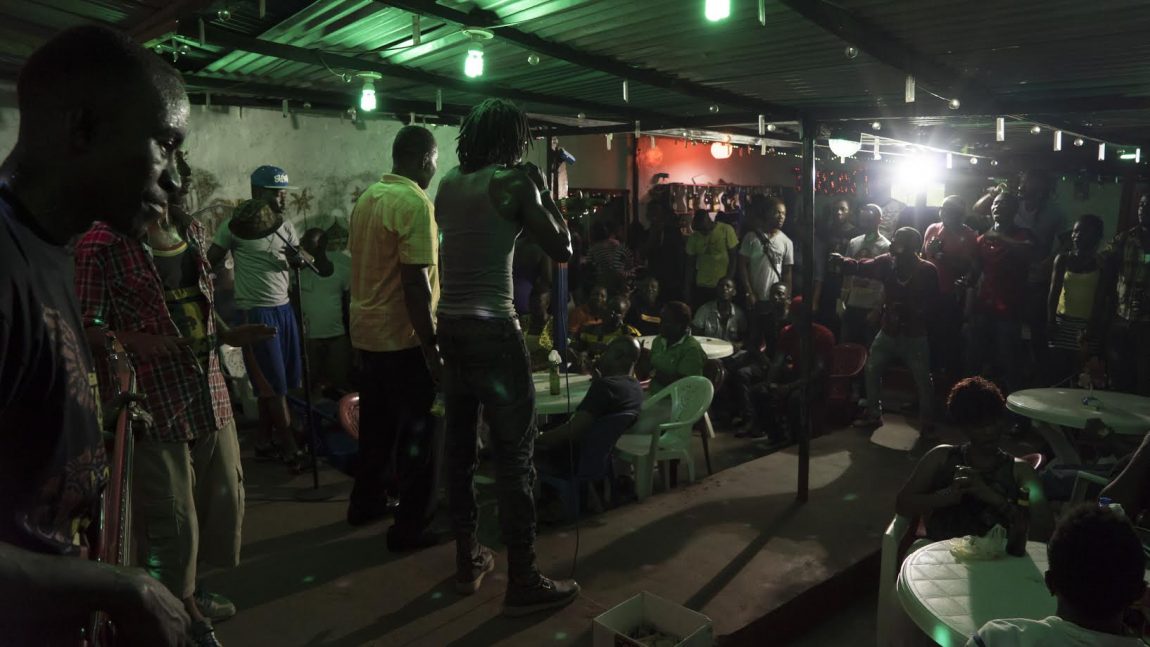Setting Liberia’s political pot onto a full boil
Takun J stirs the Liberian streets with calls for justice and accountability.

Takun J performing at '146.' Image by Author.
Takun J, currently the most popular musician in Liberia, bounds on to the stage at his downtown Monrovia nightspot, 146, on a recent Friday night. Brimming with energy and sporting camouflage pants and a matching green hoodie and bandana, he announces, “Since I dropped ‘They Lie to Us’, I’m not secure… It’s very deep, it’s getting personal. But to my fans and friends who are here tonight, I want to tell you I am not deterred.”
Emerging on the Liberian music scene a decade ago, Takun (Jonathan Koffa) has become known as the ‘Hip Co King’ (Hip co is Liberia’s leading urban music which blends hip hop with Liberian English). After being targeted early in his career by the authorities following the release of ‘Police Man’, a track that explored corrupt law enforcement officials, the government began to recognize the power of Takun’s music. In 2013, following substantial local buzz created by work with New York based edutainment non-profit PCI Media Impact, he was named the Government of Liberia’s Gender Based Violence Reduction Ambassador and in the months prior to the escalation of the Ebola crisis, he was touring the country as a UNICEF spokesperson for a children’s protection campaign.
However, the concurrent release of two new songs, ‘They Lie to Us’ and ‘Justice’, has set Liberia’s proverbial political pot onto a full boil. The songs are two of Liberia’s hottest tracks of the moment and can be heard on motorcycles buzzing along Monrovia’s busy streets or pumping up the audience and athletes at kickball and soccer tournaments.
‘They Lie to Us’ [a song we featured on this site while the Ebola crisis was in full swing in Monrovia] unabashedly assails the government, noting that ‘you screw us, you use us, and later on abuse us’ while ‘Justice’ speaks to Liberia’s legacy of impunity for prominent officials. It contains an oblique reference to an incident in which Takun was assaulted by Representative Edwin Snowe, a son-in-law of former Liberian President and warlord Charles Taylor, and a lawmaker who briefly served as Speaker of the House in the early years of President Sirleaf’s government.
The songs have spurned Monrovia’s rumor mill: citizens, distrustful of their government after a century of one party rule followed by more than a decade of civil war (enabling and contributing factors for which the new tracks touch upon), are under the impression that Takun has been arrested and imprisoned for daring to speak bluntly (at the time of writing he remains free). Takun notes that strangers, with possible links to the authorities, have begun to stop into 146, uttering threats and closely watching his movements. He, and those close to him, have received threatening phone calls noting that the government will frame and arrest him.
While the government of Liberia’s Nobel Peace Prize winning President, Ellen Johnson Sirleaf, has made some notable missteps, there remains a strong commitment, at least on paper, to transparency and freedom of expression. Liberia is one of the few African nations to join the Open Government Partnership and recently passed West Africa’s first freedom of information legislation. However, the domestic political situation is fast-changing. The United Nations Mission in Liberia may depart in June 2016 and a host of political actors have begun to jockey for the spoils of the 2017 elections, at which time President Sirleaf will reach the end of her constitutional mandate.
In recent years, West Africa has seen change driven by music as part of important social movements such as Y’en A Marre in Senegal and Balai Citoyen in Burkina Faso. With music channeling popular sentiments, these efforts have pushed for democratic reforms. In other African countries like the Democratic Republic of the Congo, these and other musicians who have questioned the status quo have been arrested. Liberia may be at a turning point at which the efforts of musicians like Takun J can have a real impact on the future trajectory of the country through mobilizing citizens behind core grievances. Will the Liberian government listen to their voices, or use its power to turn down the volume?
Stream Takun J’s music on his Soundcloud page, and download “Justice” below:


